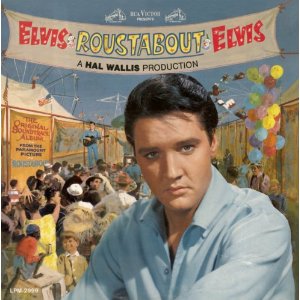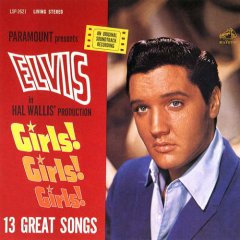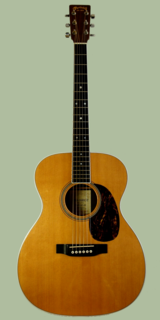
A Date with Elvis is a compilation album by American singer and musician Elvis Presley, issued on RCA Victor Records in July 1959. The album compiled a selection of previously released material from multiple sessions at Sun, an August 1956 recording session at 20th Century Fox Stage One and two from Radio Recorders in Hollywood. The album reached #32 on the Billboard Top Pop Albums chart.

Elvis is the second studio album by American rock and roll singer Elvis Presley, released by RCA Victor in October 1956 in mono. Recording sessions took place on September 1, September 2, and September 3 at Radio Recorders in Hollywood, with one track left over from the sessions for Presley's debut album at the RCA Victor recording studios on January 30 in New York. It spent four weeks at #1 on the Billboard Top Pop Albums chart that year, making Presley the first recording artist to have both albums go straight to number one in the same year. It was certified Gold on February 17, 1960, and Platinum on August 10, 2011, by the Recording Industry Association of America.

Something for Everybody is the sixth studio album by American singer and musician Elvis Presley, released on RCA Victor in mono and stereo, LPM/LSP 2370, in June 1961. Recording sessions took place on November 8, 1960, at Radio Recorders in Hollywood, and on March 12, 1961 at RCA Studio B in Nashville, Tennessee. In the United States, it peaked at number 1 on Billboard's Top Pop LPs chart. It was certified Gold on July 15, 1999 by the Recording Industry Association of America.

His Hand in Mine is the fifth studio album by American singer and musician Elvis Presley, released on RCA Victor Records in mono and stereo, LPM/LSP 2328, in November 1960. It was the first of three gospel music albums that Presley would issue during his lifetime. Recording sessions took place on October 30 and 31, 1960, at RCA Studio B in Nashville, Tennessee. It peaked at #13 on the Top Pop Albums chart. It was certified Gold on April 9, 1969 and Platinum on March 27, 1992 by the Recording Industry Association of America.

Elvis' Golden Records Volume 3 is a greatest hits album by American rock and roll singer Elvis Presley, released by RCA Victor as LPM/LSP-2765 on August 11, 1963. The album was the third volume of an eventual five volume collection, and his eighteenth altogether. It is a compilation of hit singles released in 1960, 1961, and 1962.

Elvis for Everyone! is the eighth studio album by American singer and musician Elvis Presley, issued by RCA Victor in mono and stereo, LPM/LSP 3450, in August 1965. Recording sessions took place over a ten-year span at Sun Studio in Memphis, RCA Studio B in Nashville, Tennessee, and Radio Recorders in Hollywood, California. It peaked at number 10 on the Top Pop Albums chart.

Elvis' Gold Records Volume 4 is a greatest hits album by American rock and roll singer Elvis Presley, issued by RCA Victor in mono and stereo, LPM/LSP 3921, in January 1968, with recording sessions taking place over an eight-year span at RCA Studio B in Nashville, Tennessee, and at RCA Studios and Radio Recorders in Hollywood. It is a compilation of hit singles released between 1961 and 1967, peaking at number 33 on the Billboard 200. It was certified Gold on March 27, 1992 by the Recording Industry Association of America.

Elvis: A Legendary Performer Volume 1 is a compilation album by American singer and musician Elvis Presley issued in 1974 by RCA Records. It features 14 tracks, which includes twelve songs and two interviews with Presley. It was certified Gold on January 8, 1975, Platinum and 2x Platinum on July 15, 1999 and 3x Platinum, by the RIAA on March 8, 2018.

Loving You is the first soundtrack album by American rock and roll singer Elvis Presley. It was released by RCA Victor Records in mono, LPM 1515, in July 1957 to accompany his first starring film, Loving You (1957). Recording sessions took place on January 15, 16, 17, and 18, 1957, at the Paramount Pictures Scoring Stage, and on January 12, 13, 19, and February 23 and 24, 1957, at Radio Recorders in Hollywood. These are the first sessions where Steve Sholes is officially listed as producer. It spent ten weeks at No. 1 on the Billboard Top Pop Albums chart. It was certified Gold on April 9, 1968 by the Recording Industry Association of America.

Blue Hawaii is the fourth soundtrack album by American singer Elvis Presley, released on RCA Victor Records in mono and stereo, LPM/LSP 2426, on October 20, 1961. It is the soundtrack to the 1961 film of the same name starring Presley. In the United States, the album spent 20 weeks at the number one slot and 39 weeks in the Top 10 on Billboard's Top Pop LPs chart. It was certified Gold on December 21, 1961, Platinum and 2x Platinum on March 27, 1992 and 3x Platinum on July 30, 2002 by the Recording Industry Association of America. On the US Top Pop Albums chart Blue Hawaii is second only to the soundtrack of West Side Story as the most successful album of the 1960s.

Double Trouble is the fifteenth soundtrack album by American singer and musician Elvis Presley, released by RCA Victor in mono and stereo, LPM/LSP 3787, in June 1967. It is the soundtrack to the 1967 film of the same name starring Presley. Recording sessions took place at Radio Recorders and at Metro-Goldwyn-Mayer studios in Hollywood, California, on June 28, 29, and 30, 1966. It peaked at number 47 on the Billboard 200.

Roustabout is the ninth soundtrack album by American singer and musician Elvis Presley, released on RCA Victor Records in mono and stereo, LPM/LSP 2999, in October 1964. It is the soundtrack to the 1964 film of the same name starring Presley. Recording sessions took place at Radio Recorders in Hollywood, California, on March 2 and 3, and April 29, 1964. It peaked at number one on the Billboard Top LP's chart. It was certified Gold on May 20, 1988 by the Recording Industry Association of America. The album would be Presley's final soundtrack to reach number one and his last number one album until 1973's Aloha From Hawaii: Via Satellite.

Girls! Girls! Girls! is the fifth soundtrack album by American singer and musician Elvis Presley, released on RCA Victor Records in mono and stereo, LPM/LSP 2426, in November 1962. It accompanied the 1962 film of the same name starring Presley. Recording sessions took place at Radio Recorders in Hollywood on March 26, 27, and 28, 1962. It peaked at number three on the Top LP's chart. It was certified Gold on August 13, 1963 by the Recording Industry Association of America.

It Happened at the World's Fair is the sixth soundtrack album by American singer and musician Elvis Presley, released by RCA Victor in mono and stereo, LPM/LSP 2697, in April 1963. It is the soundtrack to the 1963 film of the same name starring Presley. Recording sessions took place at Radio Recorders in Hollywood on August 30 and September 22, 1962. It peaked at number four on the Billboard Top Pop Albums chart.

Fun in Acapulco is the seventh soundtrack album by American singer and musician Elvis Presley, released on RCA Victor Records in mono and stereo, LPM/LSP 2756, in November 1963 – the November 1 date is disputed. It is the soundtrack to the 1963 film of the same name starring Presley. Recording sessions took place at Radio Recorders in Hollywood on January 22 and 23, 1963; and at RCA Studio B in Nashville, Tennessee, on May 26 and 27, 1963. It peaked at number three on the Billboard Top Pop Albums chart. The album, along with the accompanying film, would be Presley's last release before the arrival of Beatlemania.

Kissin' Cousins is the eighth soundtrack album by American singer and musician Elvis Presley, released by RCA Victor in mono and stereo, LPM/LSP 2894, in April 1964. It is the soundtrack to the 1964 film of the same name starring Presley. Recording sessions took place at RCA Studio B in Nashville, Tennessee, on May 26 and 27, and September 29 and 30, 1963. It peaked at number six on the Billboard Top LP's chart. The album was certified Gold on March 27, 1992 by the Recording Industry Association of America.

Harum Scarum is the eleventh soundtrack album by American singer and musician Elvis Presley, released by RCA Victor in mono and stereo, LPM/LSP 3468, in November 1965. It is the soundtrack to the 1965 film of the same name starring Presley. Recording sessions took place at RCA Studio B in Nashville, Tennessee, on February 24, 25, and 26, 1965. It peaked at number eight on the Top LP's chart.

Spinout is the fourteenth soundtrack album by American singer and musician Elvis Presley, released by RCA Victor in mono and stereo, LPM/LSP 3702, on October 31, 1966. It is the soundtrack to the 1966 film of the same name starring Presley. Recording sessions took place at Radio Recorders in Hollywood, California, on February 16 and 17, 1966. It peaked at number 18 on the Top Pop Albums chart.

Clambake is the sixteenth soundtrack album by American singer and musician Elvis Presley, released by RCA Victor in mono and stereo, LPM/LSP 3893, in October 1967. It is the soundtrack to the 1967 film of the same name starring Presley. He entered RCA Studio B in Nashville, Tennessee on February 21, 1967 for Recording sessions for his twenty fifth film. Supplemental material sessions took place on September 10 and 11, 1967. It peaked at number 40 on the Billboard 200.

Speedway is the seventeenth soundtrack album by American singer and musician Elvis Presley, released by RCA Victor in mono and stereo, LPM/LSP 3989, in mid 1968. It serves as the soundtrack album for the 1968 film Speedway starring Presley. Recording sessions took place at Metro-Goldwyn-Mayer studios in Hollywood, California, on June 20 and 21, 1967. It peaked at number 82 on the Billboard 200.

































